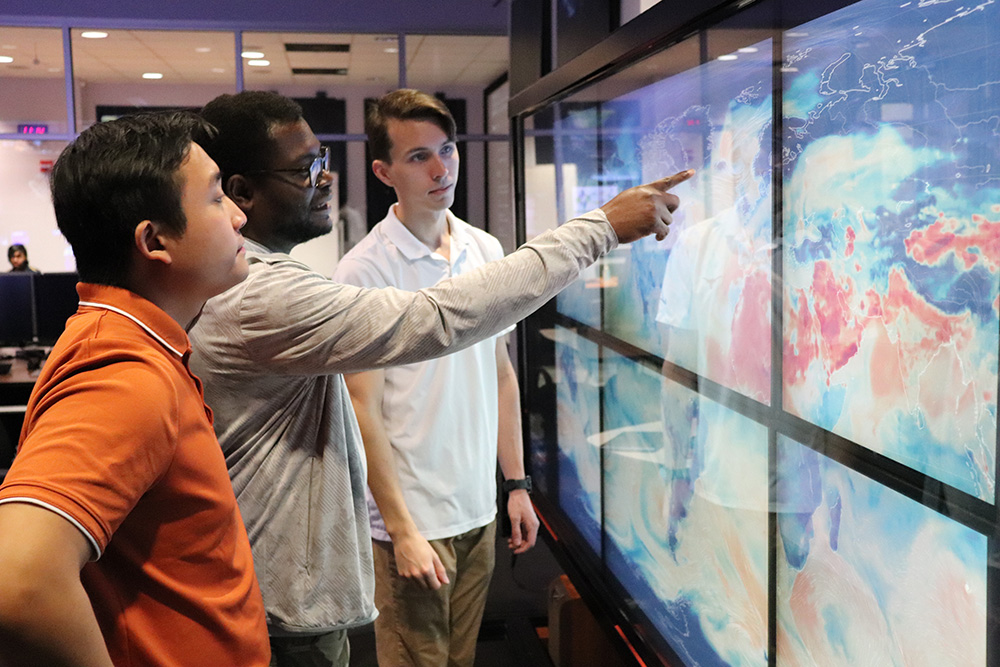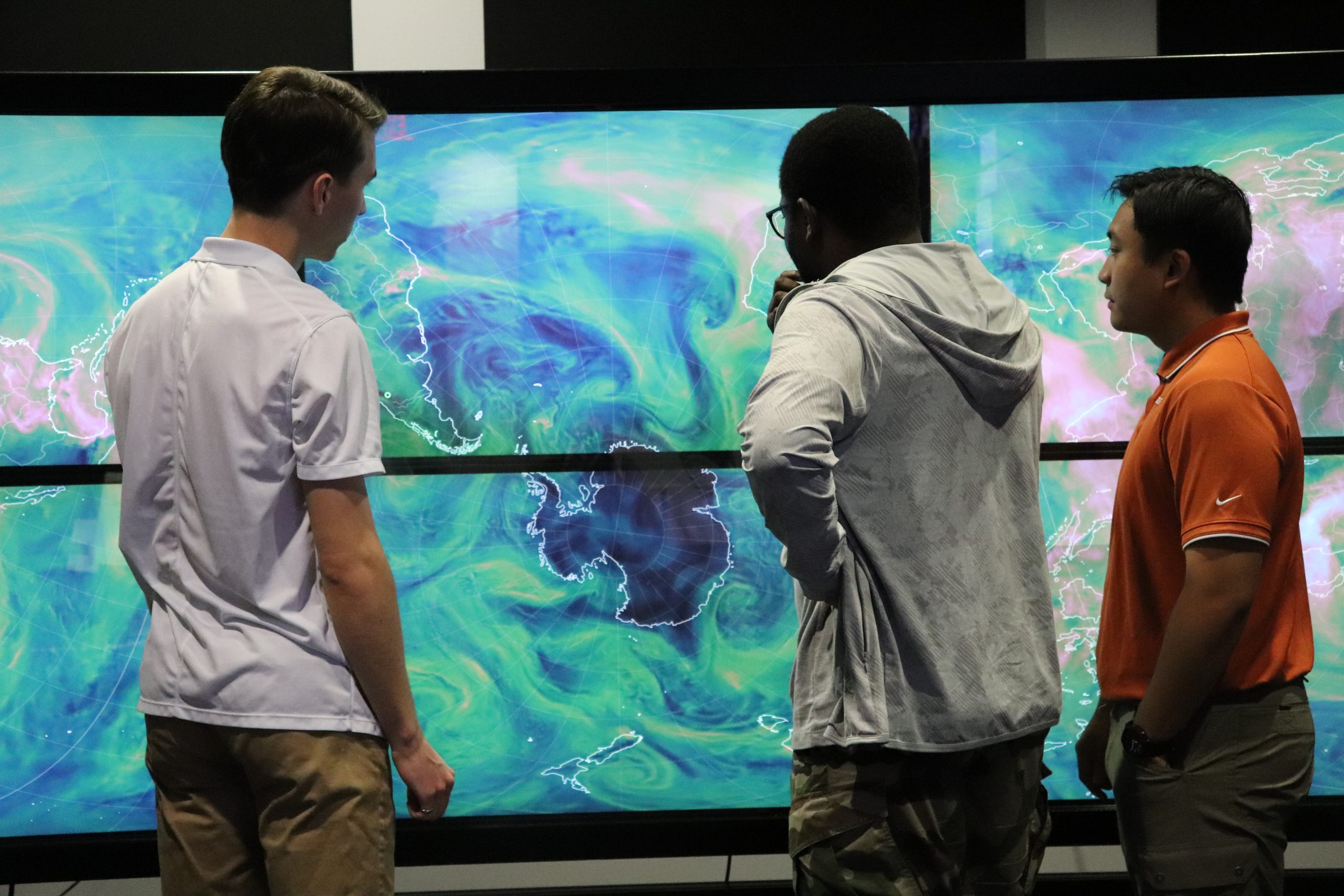
B.S. in Climate System Science
Climate change is one of the greatest challenges facing humanity. From changing weather patterns to violent storms and rising seas, it is impacting every facet of our planet and society. A new generation of climate scientists is needed to help understand these impacts and their fundamental drivers, and to guide actions and decisions at every level of society and the economy.
The Jackson School of Geosciences offers one of the few undergraduate degree programs in the country where you will gain the technical knowledge needed to tackle climate problems at an advanced scientific level and learn skills that can help lead to climate solutions.
Why climate system science?
As society adapts to living under climate change and pursues solutions, we need climate scientists to guide us. This program gives students a quantitative foundation of climate science that they can take into careers across a wide range of industries, interests, and advanced studies.
What do climate scientists do?
We all live in the climate system, but few of us know how it actually functions. Climate scientists help us understand how that system works so we can live in it more effectively and sustainably.
Climate scientists apply an understanding of physics, chemistry, and mathematics to map the behavior of our climate system using sophisticated computer models, detailed geologic records, and satellite and ground-based observations. With this knowledge, they work to predict change in the system, understand observed change such as rising sea levels, warmer temperatures, and changing weather patterns, and evaluate impacts such as those on human health, agriculture, and natural ecosystems. Climate scientists understand how the climate system works so we can better plan for the future.

A diverse range of employment and graduate school opportunities
The climate system science major provides an excellent foundation for students seeking employment after graduation as well as for those interested in continuing their studies in graduate school.
Organizations across the private, public, and nonprofit sectors cannot adequately plan for the future without climate science expertise. We are desperately in need of professionals who understand the science of our changing climate in order to assess risk and recommend solutions. This demand will only continue to grow as the effects of climate change intensify.
Graduate school disciplines students will be ready for
- Climate science
- Atmospheric science
- Oceanography
- Glaciology
Industries hiring climate scientists
- Insurance
- Climate risk consulting
- Medicine
- Public health
- Environmental law
- Public policy
- Banking and finance
- Government
Wage data for related jobs
$83,780
Atmospheric and Space Scientists
$76,480
Environmental Scientists and Specialists
$64,420
Conservation Scientists
$103,500
Data Scientists
Median annual wage data courtesy of the Bureau of Labor Statistics
Research opportunities
Climate system science students will have the opportunity to work with big climate data sets and build climate system simulations on the supercomputers at the Texas Advanced Computing Center. They will analyze geophysical and geological records from across the world to understand the climate of the past and the present, and engage directly with communities to apply climate science knowledge to real-world problems. This is cutting-edge research, and the kind of experience valued by employers and needed for advanced studies.
All Jackson School undergraduates have an abundance of research opportunities at their fingertips. Explore some of those options on our Undergraduate Research page.
Degree requirements
Every Jackson School undergraduate is required to take foundational courses that cover the breadth of the geosciences, along with advanced courses specific to their major. Students will explore these fields, advancing their quantitative reasoning skills, developing computational literacy, applying geospatial tools, and learning how to manage, evaluate, and visualize data.
Climate foundation courses
These are the courses every climate system science major is required to take. These upper-division courses prepare students to analyze and solve real-world climate problems.
Climate component
Take 12 credits (four classes).
- GEO 371T: Introduction to Ocean Sciences
- GEO 320S: Introduction to Atmospheric Science
- GEO 377P: Physical Climatology or GEO 347D: Global Warming
- GEO 338W: Paleoclimate or GEO 376S: Physical Hydrology
Computational component
Take six credits (two classes).
- GEO 347G Climate System Modeling
- GEO 371T Topic: Climate Data: Generation and Applications
- GEO 325G: Computational Applications in the Geosciences
- GEO 327G: Geographic Information System and Global Positioning System Applications in Earth Sciences
- GEO 352P: Python for Geoscience Research
- GEO 378D: Scientific Research Design
- GEO 371T Topic: Introduction to Machine Learning and Geosciences
Component electives
Take 15 credits (five classes) of any upper division geological science courses that are not already required in the climate science systems degree. Explore all upper division GEO courses in the university’s course catalog.
Geoscience courses
These are the courses required of all Jackson School undergraduates. They will typically be completed within the first two years of study.
Introduction to earth and planetary science
Learn if geosciences is right for you, and choose any class you like. Take at least three credits (one class).
- GEO 401: Physical Geology
- GEO 302C: Climate: Past, Present, Future
- GEO 302D: Dinosaurs
- GEO 302E: Earth, Wind, and Fire
- GEO 302G: Earth Science/Sustainability
- GEO 302J: Crisis of Our Planet
- GEO 302M: The Age of Mammals
- GEO 302N: National Parks
- GEO 302Q: Gems & Minerals
- GEO 303: Introduction to Geology
- GEO 303C: Intro Solar System
- GEO 303E: Earth in 2100
Experiential learning
Hone your skills in observation, data gathering, and interpretation. Take at least six credits (two classes).
- GEO 405: Life Through Time
- GEO 310T: Geodata
- GEO 315L: Earth from Lab to Planet
- GEO 420K: Introduction to Field and Stratigraphic Methods
Disciplinary breadth
These courses span all aspects of the geosciences, and provide you the foundation for more advanced study in your area of interest. Take 12 credits (all three classes).
- GEO 416E: Solid Earth Processes
- GEO 416S: Integrating Earth & Planetary Processes Through Time
- GEO 416W: Climate, Water, and the Environment
Building block courses
These courses take place outside of the Jackson School and are required of all climate system science majors. The climate system science major requires a robust understanding of mathematics, physics, chemistry, and data analytics to prepare students for advanced climate classes specific to the degree.
Mathematics
Take at least these 12 credits (three classes).
- M 408K: Differential Calculus or M 408C: Differential and Integral Calculus
- M 408L: Integral Calculus
- M 408M: Multivariable Calculus
Physics
Take all 8 credits (these two classes and two labs).
- PHY 303K: Engineering Physics I
- PHY 105M: Laboratory For Physics 303K
- PHY 303L: Engineering Physics II
- PHY 105N: Laboratory For Physics 303L
Chemistry
Take at least six credits (these two classes; labs are not required).
- CH 301: Principles of Chemistry I
- CH 302: Principles of Chemistry II
Statistics and Data Sciences
Take three credits (this class).
- SDS 302F: Foundations of Data Analysis
Read more about these courses in the University of Texas course catalog. The 2024-2025 catalog will be available soon.
The 2024-2026 climate system science degree plan is coming soon.
Complementary minors
Climate majors can select any minor available to University of Texas undergraduate students. Here are a few that we recommend pairing with a climate degree in order to further your expertise in policy, health care, sustainability, renewable energy, or risk management.
- Leadership in Global Sustainability
- Business and Public Policy
- Energy Management
- Health Care Reform and Innovation
- Risk Management
- Communicating Social Issues
- Sustainable Energy
- Law, Justice, and Society
- Public Policy
- Environment and Sustainability
- Social Inequality, Health, and Policy
Next steps: Applying and transferring
Ready to start changing the world? If you’re a high school student interested in applying to the Jackson School to be a climate system science major, please select Geological Sciences during the process of your undergraduate application to The University of Texas at Austin. Additional application information can be found on the UT Office of Admissions website and the Jackson School’s Admissions page.
Thinking of transferring to the Jackson School to be a climate system science major? If you’re an undergraduate student already enrolled at The University of Texas at Austin, you may enter the Jackson School through an internal transfer process which occurs twice a year. Please visit the Jackson School’s Internal Transfers webpage for details about the internal transfer process, deadlines, and upcoming information session dates to learn more about our school and programs. We also encourage you to contact academic advising before you start this process.